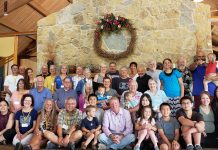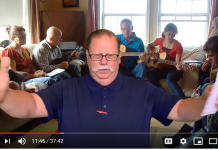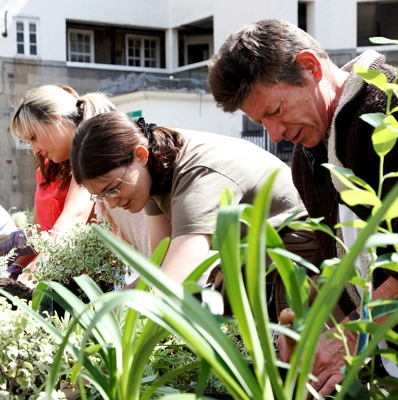 I originally wrote this post in 2010, and it’s part of down we go. but in the past couple of weeks I’ve had some interesting conversations that reminded me of it and i thought i’d pare it down and re-post it. it’s funny, still, after these years, my thought is pretty much the same except for adding one more point at the end. There’s a huge difference between cultivating community and building a church.
I originally wrote this post in 2010, and it’s part of down we go. but in the past couple of weeks I’ve had some interesting conversations that reminded me of it and i thought i’d pare it down and re-post it. it’s funny, still, after these years, my thought is pretty much the same except for adding one more point at the end. There’s a huge difference between cultivating community and building a church.
Like the word “pastor”, the word “church” has become gravely misunderstood. if the average person was asked what they thought of when they heard the word “church”, most people would say “Sunday morning, music or worship, a sermon, prayer, potlucks, either really boring or really inspiring (depending on which kind of churches they’ve been part of).”
I doubt that people would associate the word church with “deep and meaningful connections with people, carrying each other’s burdens, eating with one another, sharing resources, advocating for the marginalized, sacrificing comfort, and bringing the good news to hard places together in practical, tangible ways.”
I personally think it’s fairly easy to build a “church.” the typical elements are not that hard to find–a gathering place, music, a good message, and some kind of programmatic glue will usually do the trick. If the music and message are good enough, some Christians out there will come. I’m not saying they’ll come in droves–that’s a unique phenomenon these days, but if the basic elements are there, certain people will come and find what they are looking for.
Cultivating real community is a whole other animal.
Over the course of the refuge, we’ve muddled around in all kinds of ways and have definitely had our shares of ups & downs &, “What in the $(#&!@*^! are we doing?” moments, but I’d say the one thing that has always been central is focusing on cultivating a diverse, experiential, advocacy-infused, transformational healing community.
it’s also why we’re small. sometimes it’s all just…weird. the formulas work for a reason.
Formulas can build churches, but the formulas don’t create community.
Finding ways to knit hearts together, share life and meals, gather around a common purpose, but allow for a wide range of diversity and perspectives, nurture a spirit of justice and action, and somehow create a safe and challenging container to learn to love Jesus, ourselves, and others and be loved by Jesus, ourselves, and others requires a whole different way of thinking.
Here are a few of my thoughts about the difference between “cultivating communities” and “building churches.”
Cultivating a community requires an extremely high level of relationship that many of us haven’t learned to really do. This is where I think “church” has done a disservice to many; we have often focused on bible teaching but not bible applying. Even though we know it doesn’t work that way, we keep thinking “teaching about love” will equal love. The way to learn how to love is to have chances to practice love. we practice in close relationship and have our lives rub up against each other. Jesus’ call to us love, really love, can’t be ignored, and like so many other ways of the kingdom, it requires a level of commitment that most of us aren’t really excited to make. Being devoted to sacrificial love for one another can’t happen when we sit in the pews and listen to a message, and just go home, or only hang out in a small group that talks about the bible but never what’s going on in the deep places of our heart and experience.
.
Cultivating a community isn’t measurable. Relationships can’t be measured. Life change never happens in a snap. Slogging it out over the long haul is brutal and tries our patience. the fruit is harder to see, sometimes completely imperceptible to the un-Jesus-trained eye. the “results” we tend to look for as humans is sometimes elusive. Church building looks for quicker fixes, success stories, measurables, things to capitalize on to take it to the next level.
.
Cultivating a community requires breaking down power differentials. That’s what I love about true community, brothers and sisters of all walks of life really in the trenches together. It’s also why I appreciate Jean Vanier’s book, community and growth, so much, too. Real community crosses gender, socioeconomics, education, and other great divides that tend to typically separate us. In community, the relationships aren’t “to” or “for,” but they are truly “with,” and in real community, everyone can play and participate, not just the pretty, popular, or powerful.
.
Cultivating a community usually doesn’t provide financial stability. I whine about money all the time because I know the pressure that could be lifted if the refuge could get a big church’s coffee budget for the year. But I’m also glad we don’t compromise our values and our core DNA to attract a certain type of people who would help us not have to struggle so much. Though some who have means to help with $ do come and stay, they don’t have more power or voice and are in the same boat just looking for a place to love and be loved like all of us. We are all here because we want to be together. It also means we always have more needs than resources, but somehow it always works out in the end.
.
Cultivating a community values diversity, not homogeneity. This means holding the tension of a wide variety of differences together and honoring that true unity is not uniformity. It’s recognizing the image of God in each and every person and the value that that person with their unique beliefs, perspectives, gifts, and experiences, brings to the community.
.
My dream is that more and more people will experiment with radically different models of living in community together in a wide variety of contexts.
The world doesn’t need more “churches,” but I think it desperately needs more communities.
What are some of your thoughts & experiences on the difference between cultivating communities & building churches?
PS: I’ve got a post up this week at Sheloves magazine that folds right into this. communities are a place to help remind us who we really are, because sometimes we forget. I hope we can play our part in helping others remember the image of God they bring to this world.










































Great article. (This said by someone who is usually super critical of articles.) There are only two verses in the gospels that deal with ‘church’ but dozens upon dozens that deal with building community: Love one another, serve one another, teach one another, accept one another, carry one another’s burdens. Learning community is the tough stuff that the New Testament focuses on.
Thanks Kurt for your encouragement!
Much love,
Jose
What an awesome article. I was surprised how well your article reflects my feelings about church membership. I have made several attempts to be a typical church member of smaller local/neighborhood churches, but as a single middle aged man with no children I do not “fit in” to the typical social structure of today’s churches with their groupings & cliques. Of course I never felt unwelcome as on the surface most people at church are on their best behavior, but no matter how many groups or classes or activities I’d participate in I still felt like a guest or outsider. And it always troubles me why churches focus so much on socializing & activities resembling the secular world rather than on building relationships thru Jesus.
I have found much more fulfillment in the handful of Christian friends & fellowship I have found outside of church.
Dear brother JT
I am sorry, but the religious system cannot offer you what they don’t have. Real Love in Christ for all.
Much love
Jose
Thanks for the sentiment Jose. Appreciate it.
I am just glad to find others that see things much like I do, that I am not alone in my views of the traditional churches in America today. So glad I found this website, many of the postings & articles have been encouraging to me.
Thank you so much! I am deeply touched by this message on communities. I am so tired of church. Always one of a few selected pastors holding a sermon, no true participation or fellowship from the listeners.
Hard to make friends. Unbalanced focus of winning the whole world for Christ, but not really connecting, or loving them. Or even loving each other for real.
I needed this encouragement. I believe I am sold out. I want to be a part of a true Christian community, not a “church” anymore. Please pray that I will find or simply start being this Christian community. No more titles. Amen